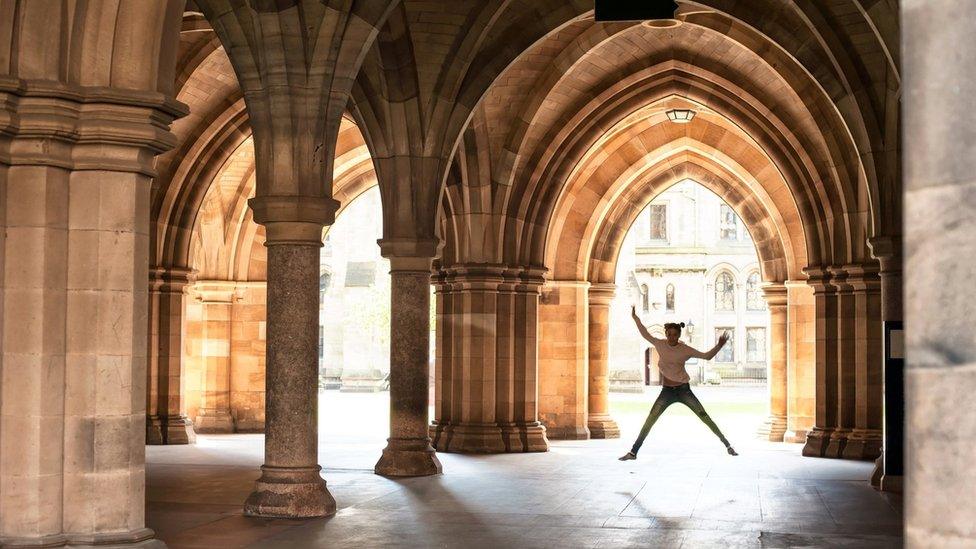Coronavirus: Reform Scotland says graduates should pay towards tuition
- Published

All graduates at Scottish universities should pay a financial contribution when they finish their studies, according to a think tank.
Reform Scotland also said students from EU countries should pay fees next year as the "survival" of the sector was at risk from the coronavirus crisis.
It comes after the body representing Scotland's 19 universities warned they could lose £500m next year.
Universities Scotland said funding structures had left the sector exposed.
The graduate endowment fee was scrapped for Scottish students in 2007.
However, fees are still charged to students from the rest of the UK and from outside the European Union.
A paper released by Reform Scotland said it was "fair" that graduates should pay back part of their tuition once they were earning the average Scottish salary.
Director Chris Deerin said: "Coronavirus has had a devastating impact on many areas of Scottish life, particularly those which were already under pressure before the pandemic hit.
"There is no better example of this than the university sector. Over half of our universities were already in deficit before coronavirus, and increasingly reliant on fee-paying students from the rest of the UK and the rest of the world to stay afloat."

RISK AT WORK: How exposed is your job?
THE R NUMBER: What it means and why it matters
LOOK-UP TOOL: How many cases in your area?
WHAT DOES IT DO TO THE BODY? Doctors on the front line explain

The Reform Scotland paper also said introducing fees for EU students next year would remove a cap on the number of Scottish students who could attend universities.
Titled "A Degree Of Fairness", the paper says it would be "bizarre" for the Scottish government to continue paying EU students' fees after Brexit.
Mr Deerin added: "The levying of tuition fees has long been an intensely ideological and political issue in Scotland. It should be neither."

The Scottish government said it remained committed to free higher education for Scots-domiciled students and the principle that access to university was based on the ability to learn, not the ability to pay.
A spokesman added: "We fully realise the detriment that losing international students from our education system will have in 2020-21 and beyond.
"We are working in partnership with universities and colleges to address the challenges and announced on May 6 an additional £75m for research."
He added that Scottish ministers would continue to ask the UK government for "appropriate fiscal support"


The Scottish government sees free university tuition for Scots as one of its defining achievements.
At its core, is the argument that it is the right thing in principle.
However the policy comes at a price.
It means there is a cap on the number of places available to Scots and, at present, EU students at Scottish universities - albeit a cap which still means the number is around a historic high.
In contrast, universities can decide for themselves how many fee-paying students from other parts of the UK and countries outside Europe to take in.
There is a real debate within the sector over whether new European students should start paying fees at some point. This may provide income and free up some more places for Scots.
But there is broad support, as a matter of principle, within Scottish universities for free tuition for Scots.
Most within universities would not want the debate over how to help them cope with the financial impact of Covid 19 to lead to a situation where new costs are imposed on graduates - something they fear could hamper their efforts to attract more disadvantaged students even if, in practice, only graduates with good jobs had to pay anything.


Use the form below to send us your questions and we could be in touch.
In some cases your question will be published, displaying your name, age and location as you provide it, unless you state otherwise. Your contact details will never be published. Please ensure you have read the terms and conditions.
If you are reading this page on the BBC News app, you will need to visit the mobile version of the BBC website to submit your question on this topic.